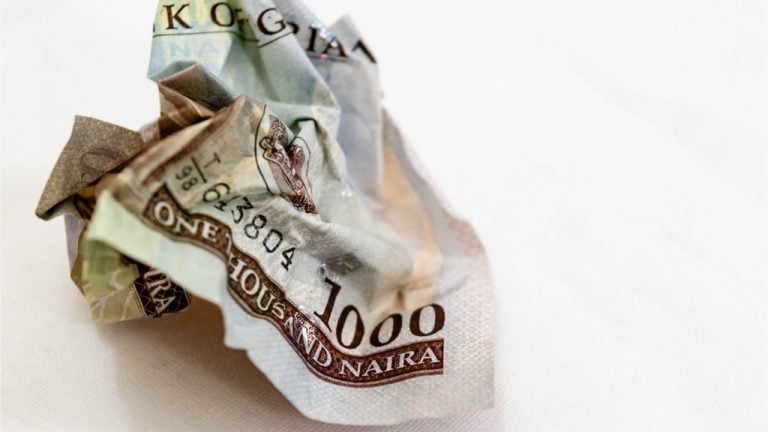Latest news about Bitcoin and all cryptocurrencies. Your daily crypto news habit.

Fighting to stop the value of the naira from dropping further, the Central Bank of Nigeria (CBN) faces yet another problem: abuse of naira banknotes. According to the CBN’s Aladeen Badajo, the central bank is concerned with the rate at which Nigerians “mutilate, deface, squeeze and even spray and sell the naira notes.” He adds that as a result of this abuse, Nigeria is now spending more money on reprinting banknotes than it should.
According to a report that quotes Badajo, an assistant director at the CBN’s Currency Operations Department, offenders now face possible jail time. Badajo elaborated:
Abuse of the currency attracts a penalty of not less than six months or a fine of not less than $120 (N50,000) or both.
The assistant director adds that instead of damaging the banknotes, “people [should] consider Nigeria’s currency as a symbol of national identity.”
Meanwhile, Bitcoin.com News reached out to Nathanial Luz, a Nigerian “cryptocurrency thought leader” to understand why his countrymen continue to abuse the banknotes despite the CBN’s pleas and threats. According to Luz, Nigerians see the practice of spraying banknotes as some kind of celebration and the CBN is aware of this but has not been able to enforce a ban. Luz told Bitcoin.com News:
Nigerians go as far as buying new banknotes at a premium of 70% just so they could spray the notes. So I could buy $10,000 worth of naira banknotes for between $15,000 and $17,000 just to spray the money.
Nevertheless, Luz says he is certain that this practice has little to do with the naira’s continuing depreciation.
Do you think the renewed threats by the CBN will end the Nigerian practice of spraying banknotes? Tell us what you think in the comments section below.
Disclaimer
The views and opinions expressed in this article are solely those of the authors and do not reflect the views of Bitcoin Insider. Every investment and trading move involves risk - this is especially true for cryptocurrencies given their volatility. We strongly advise our readers to conduct their own research when making a decision.